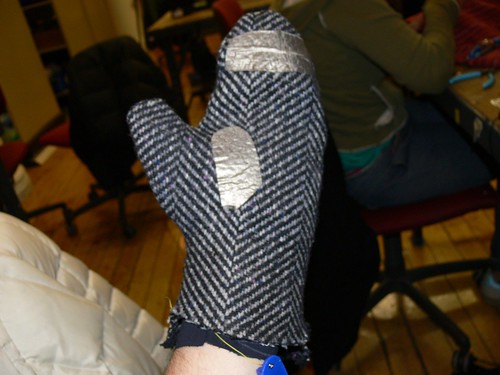
Check it out here: The Baby Mitten
and a video of it in action: the baby mitten

Response to Urban Armor at Studio-Orta, an essay on designer Lucy Orta’s fashion:
Lucy Orta’s works of clothing-as-habitat by design raise the issue of homelessness, and it’s deeper impact on our lives. One aspect that I think is most significant is the homelessness as a lifestyle choice, as opposed to being an unfortunate circumstance. We tend to think of (or ignore) the majority of homeless people who suffer from mental illness or addiction; those of us in our air-conditioned condos and suburban communities can sympathize safely from a distance.
However, when we look at the smaller population of squatters, hippies, backpackers and whomever else who actively choose a lifestyle of homelessness. I often find myself confused or resentful of people who make this choice; perhaps because I am so entrenched in a capitalist society that values possessions, and land ownership.
Lucy Orta’s pieces force me to reimagine this nomadic counterculture not as one of anti-consumerism, per se, but of conservation, of independence and freedom of spirit.
Paul Virilio talks about a prophetic vision in Orta’s work, and I tend to agree — as population density increases and natural resources are wasted, as communities are fractured through mass production, I can imagine a world in which wearable housing is not just a necessity, but a choice individuals can make to reconnect to each other, to nature, to themselves.
This was one of two masks, this one meant to “reveal yourself” Decoupage’d images of friends and family. Turned out a little creepier than I imagined…
We had an interesting discussion about privacy in our wearables class today, and this post over at John Battelle’s Searchblog seemed apropos:
As we move our data to the servers at Amazon.com, Hotmail.com,
Yahoo.com, and Gmail.com, we are making an implicit bargain, one
that the public at large is either entirely content with, or, more likely,
one that most have not taken much to heart.